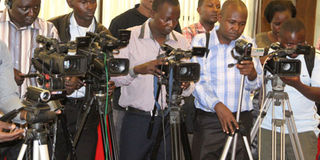Ups and downs of public editor’s job, and the interests of readers

Journalists at work. PHOTO | JARED NYATAYA | NATION MEDIA GROUP
What you need to know:
- The tendency for journalists to disregard criticism even when it is justified is astonishing. Of course nobody likes to be criticised, myself included, but journalists have a special obligation to own up to their mistakes and make corrections. Still, many of them do not do so willingly and freely.
- You will have noticed, for example, that there are rare instances when journalists formally own up to having made a mistake and they usually do so under threat of being sued or when some “heavy” members of society are breathing down their necks.
This is my last column this year as I am taking leave. I am repairing to my village, where I was a professional mole catcher and popular composer of mole-catching songs, as a change from listening to complaints. But in this end-of-the-year notebook I want to mention three things I will not forget.
I will not forget the loneliness of the job. Right from the word go, my job was to champion the rights and interests of readers that came in the form of complaints. In the process, almost inevitably, that meant criticising the work done by fellow journalists. Criticising journalists does not win you friends in the editorial fraternity.
While I have enjoyed friendship and support from some journalists, I have also experienced hostility and frustration from others.
Mind you, the hostility is not reserved for the public editor. One reader had been “banned” from appearing in the pages of the Nation for engaging editors in what was said to be endless arguments.
The tendency for journalists to disregard criticism even when it is justified is astonishing. Of course nobody likes to be criticised, myself included, but journalists have a special obligation to own up to their mistakes and make corrections. Still, many of them do not do so willingly and freely.
It is strange that journalists, who are in the business of criticising others, do not visualise themselves as people who can and should be criticised. You will have noticed, for example, that there are rare instances when journalists formally own up to having made a mistake and they usually do so under threat of being sued or when some “heavy” members of society are breathing down their necks.
There are, however, some NMG journalists who receive and accept criticism well. It is invidious to mention names but I cannot help but name Ochieng Rapuro, the managing editor of the Business Daily, and Tim Wanyonyi, the managing editor of Saturday Nation.
Aware of the intolerance of many journalists, a senior NMG official warned me when I took the job in January 2015 that journalists had given me less than a year to self-destruct. Maybe that is why the world over, the job of a public editor is not a career but terminal (or retirement) work and its normal span is two to five years.
I will not forget the tyranny of sub-editors. Everybody, including the public editor, needs a sub-editor. Sub-editors, or subs, check the written text, such as this article before it is published. They are supposed to ensure the correct grammar, spelling, house style, and that the copy is factually correct and in keeping with the official editorial policy. They also give it a headline, which is supposed to tell the reader what the article is about and entice him to read it.
Some of the subs cause most of the complaints that I have to deal with daily. As I type this in the early hours of Thursday morning, one reader — this is not unusual — distracts me.
“Today’s Taifa Leo has lots of translation setbacks. As a lover of Kiswahili, a freelance journalist, I’m quite irritated especially for the TSC story on page 5,” he says.
I will not forget hawk-eyed readers. The readers, judging by their complaints, are smart and quick to spot errors and inaccuracies, and they can be demanding and exacting.
But not all of them stay on editorial matters. Sometime back I was hounded by a man who had returned from Malawi, where he had lived for 40 years. He wanted a wife and for three weeks he called and texted me, asking me to hook him up with a woman to marry. I take all calls. But, finally, I decided not to pick this one any more.
There have been others calling in connection with jobs, tenders, and everything else under the sun but editorial. Such readers kept me busy fielding questions that do not belong to me.
I am not complaining or making a mountain out of a molehill, but that is the more reason I want to return to the village to catch moles, instead, until January 9 when I return.
Send your complaints to [email protected]. Text or call 0721 989 264





